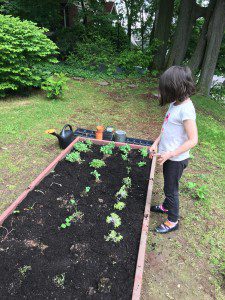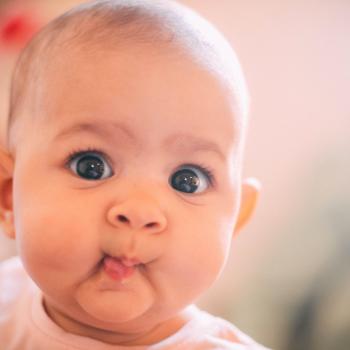We survived the first day of online classes–except for my continued failure to untangle who was supposed to be in which class. More phone calls today. It’s the long impending dread that gets me every time–the business of waiting and waiting and waiting for the axe to fall. We buy these classes in May, even before we’ve finished the last ones, and then we shove the idea of them being there as far away as possible, into the dark corners of the psyche. But eventually, especially after you’ve had to buy books, the knowledge returns to the conscious mind. It’s kind of a drag.
Anyway, the point being, I wanted to offer a word of encouragement to those with very small children. I occasionally think of myself as one such person, but that’s an illusion. My youngest is six and a half. She has language, a consciousness of time, basic self control, and an increasing sophistication of her manipulative powers. The oldest, I think, can be said to be an adult, if you were to count it in a classical sense. She can feed and clothe herself, and doesn’t always need to be told what to do. Sure, there are gaps in her knowledge–she needs to learn how to drive, how to deal with bureaucratic modernism (what modern people call adulting), and stuff like that. But she has herself under regulation, which is kind of the goal I’ve had percolating in the back of my consciousness for many a long year. If you’d asked me when she was born what I hoped for, I probably would have said that I wanted her to be someone who could basically cope, and who could survive life in this complicated world with basic good humor.
But if you’d asked me how I proposed to get her there, I would have stared at you in alarm. Because I had no idea. And I still don’t.
I mean, of course, I fed her, and bathed her, and didn’t completely neglect all the functions of motherhood. But when each milestone came along, I wasn’t the force driving her progress forward. I stood by and watched in amazement as she learned to walk, and talk, and, eventually, read, and make cakes, and make friends. It’s not that I wasn’t there contributing in some sense, but I didn’t teach her any of these things, not in the way that I understand the word Teach.
And so it has been with each of them as they came along. I am the ever present by-stander, the person who watches the other unfold. It’s a matter of being in the right place at the right time, not any particular action or decision that would catalyze some critical moment of learning.
Cavalletti talks about the mystery of the child, a phrase I’ve hung onto for many a weary day. In a world where you are supposed to control everything–your car, your house, yourself, your facebook feed, the way you see yourself, the way other people see you–how do you control the outcomes of child rearing? Because that’s what we want to be able to do. We want to be able to Know how it’s going to be. Will the child know Jesus? Will he get a job and be ok? Will she be able to have children? Will she want to? Will something bad happen? Or enough good things to outweigh the bad? I’ve read some of the books that tell you exactly what to do to ensure the outcome you want.
And certainly, there are plenty of things that it’s very bad to do–terrible neglect, lying to the child, over protection, the list could probably be quite long. But most people, no matter what the drumbeat of inescapable 24 hour news may say about it, are not those people. You showing up day after day after day to do your job, however well or badly you do it, takes you out of the category of monstrous parent who ruins the life of her child.
When my first child was about to be born, someone clever said to me, ‘You’re not that powerful.’ Meaning, you’re not strong enough to wreck everything. But also, you’re not strong enough to do it perfectly either. If you are doing your best, the thing that will happen is that your child will grow up and be fine.
The mysterious nature of the child is strong, and sure, and unquenchable. It’s like a seed really, planted in fertile soil. It grows in secret, in the dark. You don’t know what’s going on half the time. And it’s not useful to constantly dig it up and examine it and try to understand. You have to let the seedling be, to stand by and watch while it grows, giving it what it needs at the proper time. But that means you can’t really take credit for what happens either. When your child does something amazing, it wasn’t you who did it, it was she herself. When your son surprises you with his strength and intellect, you can only be grateful, you can’t really pat yourself on your back, because it wasn’t your doing.
But this is really true for your own self. You yourself are a mystery. The mystery of the interior person. You don’t know what’s going on in the depths of your body and mind. Occasionally you can have glimpses. But when you do something wonderful, or realize something important, you can only take half credit. The praise has to go to God who, having set the stars in place, also knows and sorts out the depths of the human heart.
The careful patient business of loving your neighbor–your child, your friend, the stranger, the difficult person in your day–has to begin with an acknowledgment of the great mystery of that person, and your own not being powerful. You be in place, and do the things you are called to do, and watch what happens. Give the cup of juice. Preach the gospel. Administer the medicines and comfortable words. Put the dinner on the table over and over and over. But then stand by and watch to see what happens.
















